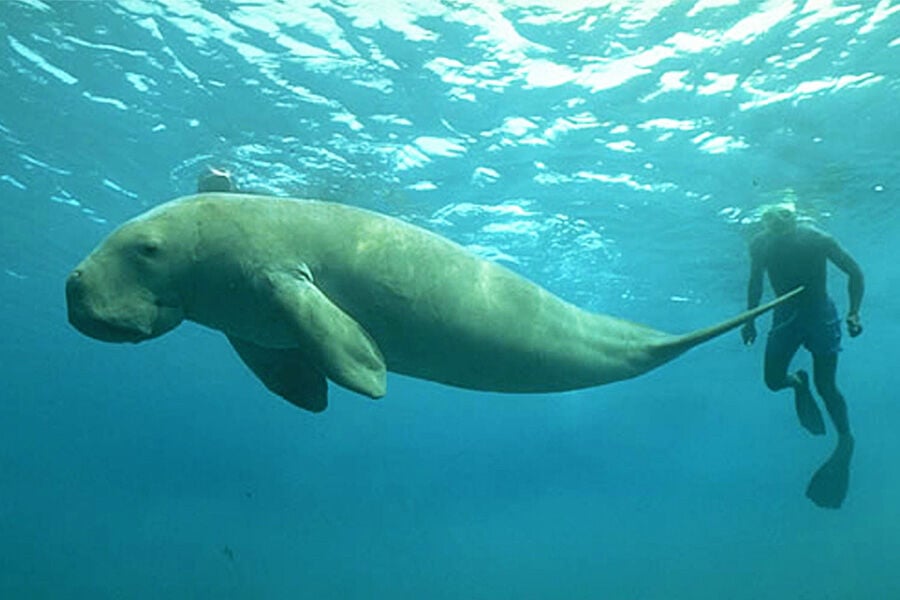Thailand enhances protection for dugongs following tragic deaths

The Deputy Prime Minister and Minister of Natural Resources and Environment (MNRE), Police General Patcharawat Wongsuwan, directed officials of national parks and other marine wildlife officers to enhance the protective measures for dugongs.
This decision comes in the wake of the tragic deaths of two female dugongs, presumably a mother and her calf, that were discovered washed ashore on Koh Mak Noi, near the well-known Koh Panyee in Phang Nga Bay.
The Department of Marine and Coastal Resources (DMCR) shared the directive from Deputy PM Pol. Gen. Patcharawat online. However, the exact date of the dugong’s demise was not revealed. DMCR officials, alongside Ao Phang Nga National Park officers, arrived at Laem Pratok on Koh Mak Noi to find that both deceased dugongs were female.
The larger adult measured 3.3 metres, while the younger calf was 2.2 metres in length. Preliminary reports suggesting that a boat propeller accident caused their deaths were unconfirmed, as no wounds were found on their bodies.
The bodies were transported to the Sireetarn Marine Endangered Animals Rescue Centre in Phuket for further examination to ascertain the cause of death. Officers confirmed that the dugongs had died very recently. The officers also took the opportunity to educate local villagers about dugongs, which are known to migrate from Trang province to feed on seagrass in Phang Nga Bay.
Pol. Gen. Patcharawat convened a meeting, demanding increased efforts to protect dugongs, as he stated that at least 20 had been found dead in local waters since the start of the year.
Seagrass fishing
The meeting was attended by former DMCR Director Atthaphon Charoenchansa, who now serves as Acting Director-General of the Department of National Parks, Wildlife, and Plant Conservation (DNP), current DMCR Director-General Pinsak Suraswadi, Director of the Office of National Parks, Chaiwat Limlikit-aksorn and Permsak Kongkaew, Director of the Conservation Area Management Office No. 5 (Nakhon Sri Thammarat) and the chief of the Andaman Sea National Park.
Pol. Gen. Patcharawat stated that fishing in seagrass areas was strictly prohibited, and boats must not exceed speeds of three knots in known seagrass areas. He added that boats should not exceed speeds over 20 knots in any areas known to be inhabited by dugongs.
“We need to jointly analyse and find ways to determine measures to care for, protect, and prevent injury and death of rare marine animals, especially dugongs,”
He further added due to global warming, seagrass resources, which are the source of food for dugongs, are deteriorating, resulting in the movement of dugong populations. They are moving to other seagrass areas where there may be a lot of water transport and fishing activities, which affects the livelihood and habitats of dugongs and death from water accidents can occur.
Pol. Gen. Patcharawat confirmed that measures have been presented at Hat Nappharat Thara-Mu Ko Phi Phi National Park to preserve dugongs and seagrass beds. These measures aim to mark seagrass zones and risk areas that dugongs use on their migratory journeys to find food.
Marine officials were specifically ordered to increase patrols at protected seagrass areas to counter illegal fishing. Pol. Gen. Patcharawat noted that the DMCR had identified 11 protected seagrass areas in Phang Nga Bay where such measures are to be implemented.
The remaining nine known protected seagrass areas were listed as Ao Ban Khlong Khian, Phang Nga; Koh Mak, Phang Nga; Chong Lard, Koh Yao, Phang Nga; Ao Tha Pom, Krabi; Ao Nang, Krabi; Ao Nam Mao, Krabi; Koh Sriboya, Koh Pu, Krabi; Koh Lanta, Krabi; and Laem Sai, Krabi.
Members of the public who observe illegal fishing in protected areas or other activities that put dugongs at risk, or who see a dugong in distress, were encouraged to report to the DMCR Volunteer project on the hotline 1362, reported Phuket News.
Latest Thailand News
Follow The Thaiger on Google News:


























